 In 2006 I came here as a summer associate. And we just ended up here. We liked it here and I liked the job, and here we still are. Pemberton [Law] itself has evolved in the time I’ve been here—I’ve kind of seen niches develop just in the last 12 years. – Josh Heggem
In 2006 I came here as a summer associate. And we just ended up here. We liked it here and I liked the job, and here we still are. Pemberton [Law] itself has evolved in the time I’ve been here—I’ve kind of seen niches develop just in the last 12 years. – Josh Heggem
 Steve Besser
Steve Besser
Dolan & Besser, Litchfield
When I got out of law school, I went to Duluth to be a torts attorney. A civil attorney. I joined Falsani, Balmer, Berglund, & Merritt, which was one of the three large personal injury law firms in town. November of 1997 is when I came to Litchfield. The first big change was—I’d gone from a specialized boutique practice, personal injury and workers’ compensation, to a general practice, which you pretty much have to be in a small town these days. You take whatever walks in the door.
A conversation I had shortly after my arrival that I’ll never forget: Will [Dolan] was walking through the office a couple of days after I got here, and he said, I need you to do a title opinion. I said, okay. He said, you’ve done a title opinion before, haven’t you? I said no. He said, what kind of attorney has never done a title opinion? I’m a smartass. I said, have you ever had a leg-off case against a freighter company? He said no, and I said, what kind of attorney are you? [Laughs]
When I got here, there was a big learning curve coming from a specialized firm to be a small-town attorney. Everyone wants to ask you a question. The people in town who know you love to stop by. They walk in the front door—this is both the bane and the blessing of a small-town practice—and say, I just need to see Will or Steve for a minute. Which means meet me out in the lobby, I’ve got a couple of questions to ask you and I don’t want you to open a file. [Laughs]
There are a lot of daily interruptions from walk-ins or quick calls. And we encourage our clients to do a quick phone call, because a lot of times in two or three minutes, we can give them a little bit of advice and help them avoid having to come in and see us professionally. We both like that aspect of the practice, because you generally go into law not just to have a profession but to do what we’re supposed to do—solve problems, help people.
My practice started to change when I had some clients who came in and did a sale of their business to a national entity. I have now become kind of the lead contract counsel for this national entity, and a lot of my contract work comes to me via email from all around the nation. I’m spending a lot of time reviewing contracts and sending them back via email. So I have both a local practice and a national practice. Technology has enabled me to do that.
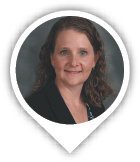 Michelle Zehnder Fischer
Michelle Zehnder Fischer
Nicollet County Attorney, St. Peter
When I started my practice, the Nicollet County Attorney’s Office was a part-time county attorney’s office. So I did part-time prosecution and county attorney’s office work and I also had a civil practice. When my boss, County Attorney Mike Riley, retired, there was an opportunity to consider making it a full-time office. The board appointed me to finish the term of Mike Riley in the fall of 2011 and decided to make it a full-time county attorney’s office.
Through the years the case load has increased. We’ve seen increases in criminal cases coming in and also in the child protection/human services area, from child protection matters to vulnerable adult prosecutions to child support work. It does seem that there’s more interconnection of all the pieces in a lot of cases. We might have a family we’re dealing with that has a family law case, and then they might have a child protection case and a criminal case. And there could be a civil commitment case or a child support case. Those components are often intertwined. And trying to juggle all those interconnections in addressing whatever the issues are seems to be getting a lot more challenging.
As are the issues—we’ve certainly seen an increase in mental health issues since I started. I don’t know whether it’s due to increased awareness of mental health issues or it’s a rise in mental health issues that people are facing. I think it’s probably a combination of both. The changes in what the county attorney’s office are seeing involves changes in the impact that chemical use and mental health issues are having on our work. Compared to other outstate areas, we’re fortunate to have more access to resources than some other counties of similar size.
That said, we continue to struggle with finding enough services to offer individuals. We struggle to find service providers for chemical dependency and mental health. I attended a meeting recently where I learned that our providers for adolescent chemical dependency treatment continue to decrease. Which I find concerning, because if we can’t address those issues when people are kids, we’re just going to continue dealing with those issues when people reach adulthood. Early intervention and prevention are always the better answer.
I have four assistant county attorneys, I have four paralegals, and then I have a victim/witness coordinator. That’s a full-time grant-funded position. The coordinator is something that had been a part-time position that evolved over time. We saw, number one, an increase in our statutory obligations as it relates to notifying victims of their rights. But we also saw an increased need to respond to victims and their needs.
I’m also the civil adviser for the county and the county board. My civil practice can include contract review, looking at any liability claims, addressing data practices issues. Somebody once described the county attorney’s office as a kind of general law practice, because we do so many different things, both criminal and civil, through the course of the day. I handle drainage law for the county. We handle civil commitment and guardianship-conservatorship questions. We handle child support and paternity disputes. Eminent domain and condemnation actions. Any general civil questions that departments have, our office is responsible for responding to those.
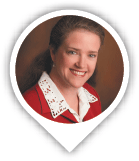 Barbara Heen
Barbara Heen
solo practitioner, Willmar
I married a man from western Minnesota, and one of his life goals was to raise our children on the farm he grew up on. At the time we met and got married, we both lived in Minneapolis. He had a career as a journalist and communications professional, and I was working in financial services and going to law school. I wasn’t interested in being a traditional attorney. I wanted a credential that I could use to do strategic analysis for insurance and investment companies. My intention was to work in downtown Minneapolis forever.
After 17 years of working downtown, corporate America and I effected a very amicable divorce. I got the kids, and at that time we understood that I simply was not built to be successful in very, very large multinational, multi-billion-dollar corporations. I used that time after I left working downtown to really think hard about what I’m actually good at. And during this evaluative time, in the early 2000s, a little old lady from church called me up and asked me to write her will. [Laughs] You hear of things like that, but it actually is true.
So I got the little old lady’s will done and another family from church called me and said, you know, we’ve got two minor children and we should probably do something. So I did that estate plan with minors, and then I thought, wow, this is pretty great. I love working with people. And I had just spent 17 years avoiding at all costs working directly with the clients. Come to find out, that really was where my true heart is.
We moved to the family farm in the country, 30 miles south of Willmar. Willmar has a great tradition of a few very large employers, but they’ve done a really good job as a community of having medium and small businesses as well. So it just seemed there was enough life and livelihood that we made Willmar our commerce center.
Because of my planning background, I work very, very hard never to see the inside of a courtroom. I don’t litigate, I refer that out. My law practice is a pure counseling and drafting business. So I work with clients on estate planning and small business transition, whether that’s a farm or another kind of small business. But I don’t branch out into any other area of the law, just so that I can keep control over my clients, my calendar, my expertise. Just getting our kids through school was a commitment, and if you have court dates on your calendar—if you do other kinds of law—then I would not have control over my time to the extent I wanted. Controlling my time was more important to me than building my business in a financially lucrative sense.
It’s worked out pretty well. I have fiercely loyal clients and they bring their kids to me, their parents, their friends and family. So my practice is smaller on purpose, but it’s guaranteed. I have people who will call me every couple of months and people who won’t call me for five or six years. But whenever they call me, they’re ready to go and I can serve them. I’m the greatest part-time estate planning attorney you ever met.
 Josh Heggem
Josh Heggem
Pemberton Law Firm, Fergus Falls
I was clerking for a judge in Anoka when I was in law school, kind of a summer deal where I was getting credit for it, and I ran into a guy who was clerking for another judge and happened to be from Fergus Falls. I was talking about wanting to live and work in a small town, and he said, you should check out Pemberton Law—they’re in Fergus Falls. I had driven past Fergus Falls a couple of times on the freeway but had never been there. I jumped on their website and here’s this rather large law firm in outstate Minnesota that actually had a summer associate program and was operating more like a bigger law firm. I’d been searching in the Brainerd area and there were a lot of smaller, four or five attorney firms there, but nothing like the size of Pemberton.
In 2006 I came here as a summer associate. And we just ended up here. We liked it here and I liked the job, and here we still are. Pemberton itself has evolved in the time I’ve been here—I’ve kind of seen niches develop just in the last 12 years. Back then people who came on board kind of started out as a small-town lawyer. We’d have people come on and do a little of everything. That’s what I did. You start out helping whoever walks in the door. I did lots of different things the first couple of years—real estate, a lot of general litigation, family law. I represented a few clients’ kids on DUIs. Random stuff.
This firm has been around for like 130 years. We can actually trace our roots back to a lawyer who had an office upstairs in the bank building, which we now occupy entirely. Historically, back when Dick Pemberton started, it was a litigation defense firm that did a lot of insurance defense work. And a lot of general small-town practice, like estate planning. That’s changed even in the course of my time here—we’ve got practice groups in labor and employment, litigation, estate planning, real estate, corporate law. We have groups of people that are all specializing in those particular areas. I’ve got two other partners who do labor and employment law exclusively.
Even from the first day, I was involved with our labor and employment group, too. My early involvement was mainly with workplace investigations, which I really enjoyed doing. I quickly kind of became the go-to person at the firm to do workplace investigations. And that evolved into doing all kinds of other labor and employment work—primarily for public entities at first, because that’s what some of my partners were doing. But also doing more and more work for private entities and nonprofits. We represent a lot of electrical cooperatives, and I work with them on labor stuff.
I definitely would call myself a workplace investigator. I do one to two a month, generally, and a lot of what I would call human resources consulting, where I’m working with HR on various types of problems, from 15-minute problems to ones that can involve lots of work over the course of months. I feel like I’m in a cool position, because I do this specialized work that not a lot of other people are doing, but I also get to live where I want to live. And there are a lot of benefits to living in small-town Minnesota. So in my view, I get the best of both worlds.
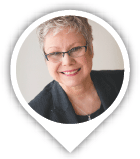 JoEllen Doebbert
JoEllen Doebbert
solo practitioner, Alexandria
I opened my own office when my second child was born. At that time, I knew I wanted to do more estate planning and less litigation. Over time, I reduced my family law and litigation practice and transitioned, over several years, to an estate planning, probate and trust administration, and elder law practice.
Preparing estate plans for clients who, for the most part, are in a positive and planning phase of their lives has meant a more enjoyable practice. In addition, working with clients who are at the end of their lives, who are reflective of where they have been and where they are going next, has been an honor and a real joy, which has brought meaning to my life and fulfillment to my practice.
Another aspect that I have added to my practice over the last decade, which has been very meaningful to my clients and to me as well, has been what I call a legacy conversation. I give the client the opportunity to talk about their values, what their life has meant to them, and how they want to be remembered, and the conversation is recorded and saved on a CD for their loved ones to listen to at some future point in time. The recording is a real treasure for family, and it is an honor and a blessing for me to hear people’s stories and help preserve their memories and life lessons.
I typically use a combination of flat rate and hourly billing, depending on the service I perform. Once I know a client’s situation, my goal is to give the estate planning client a written estimate of the costs involved by quoting a flat fee for the documents to be prepared, supplemented by an hourly rate for extra conference or research time if the number or extent of conference time, for example, cannot be predicted at the outset. Clients appreciate having a ball park estimate of fees early in the representation. As the owner of my firm, I am able to adjust my rates and fees on a case-by-case basis for those I feel cannot afford a certain fee.
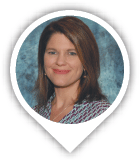 Molly Hicken
Molly Hicken
Cook County Attorney, Grand Marais
I started my first job as a lawyer in this office 12 years ago, as the assistant Cook County attorney. This office has just two attorneys—the county attorney and the assistant county attorney—and two staff. That tells you how small we are. I came to this kind of work out of law school wanting a career in public service and wanting a career that would have me in the courtroom. So when I moved back to Minnesota from Oregon, where I went to law school—I’m from Anoka—I was looking for assistant county attorney jobs thinking they would give me a good mix of public service and courtroom work. It checked both boxes for me.
I came to this office specifically because it’s one of my favorite parts of the world. My parents have a cabin up here, so I was familiar with the North Shore and a fan of outdoor adventures. I’d spent my summers up here during college, so I knew I liked the area. I had never lived here year-round, so that was a new experience that took me a while to get used to.
As assistant county attorney, I was doing mostly criminal prosecution and child protection work. Also civil commitments. I did that work primarily for about four years, until this office was greatly disrupted by a shooting. Our former county attorney, Tim Scannell, was shot, and that happened in our office. I was present. It was a very traumatic event. That was four years in, and when Tim was in and out, I started picking up more civil work. Then he was later involved in a scandal related to a 17-year-old girl, and prosecuted for that.
That’s how I went from assistant county attorney to county attorney. I was officially appointed county attorney in 2014, and I’ve been in that role since. This is my second term as county attorney. I guess I started taking on more than prosecution and child protection in 2011, and that’s when I started getting a grasp on all the various work that goes through this office.
It’s greatly varied. A county attorney’s work has been compared to general counsel work for a corporation. You are practicing in a handful of areas of law every single day, constantly learning new things. There’s no specialization, really. Municipal legal work is contract drafting and contract review, advising our county officials on open meeting and data practice laws, procedures having to do with official actions taken by the board, advising department heads on zoning actions, sitting in on planning commission meetings and board of adjustment meetings. We advise the public health and human services departments on licensing matters, such as day care and child care licensing and foster care licensing. It’s really a great variety of work.
In general our case load has gone up. Our population has remained the same, but our case load has gone up. And I can’t tell you exactly why, but I can tell you it correlates with a rise in our tourism base—the number of people coming into our county as tourists. That’s where a lot of our work comes from. The criminal case load includes a lot of DUIs—it’s probably proportionate to other counties our size, but more of our DWIs involve people who don’t live here; they’re visiting. As our tourist population has risen, our case load has risen slightly.
The types of cases haven’t changed substantially. It’s still primarily DWIs, domestic violence, and drug cases, as far as major cases go.
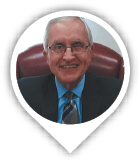 Paul Muske
Paul Muske
Muske, Suhrhoff & Pidde, Ltd., Springfield
I always wanted to be an attorney, from the time I was in high school. After graduating from law school, which was interrupted by a two-year stint in the Army, I practiced in Glencoe for about two and a half years. Then my wife graduated from law school and it wasn’t going to work for us for her to work in the same county because of potential conflicts of interest. So we decided to go out on our own, and there was a gentleman who had retired from practice in Springfield and we saw an ad in the Bench & Bar and wound up coming down here. We’ve been here since 1978.
We started out doing just everything—real estate, estate planning, probate, typical smaller town work. In 1981 we became city attorney for Springfield and for Comfrey, and since then our municipal work has expanded. In those early days I did divorces, bankruptcies, just about anything that came through the door. I no longer do divorces or bankruptcies, so basically it’s real estate, estate planning, and probate along with municipal that are our primary areas.
What we do at our firm really hasn’t changed a lot. What we do is help people solve problems. That’s still the bottom line. With the typical residential property sale, little has changed over the years. I think the biggest change has been that white-out and carbon paper used to be our best friends, and technology has changed how we provide the services. The services themselves have probably not changed drastically.
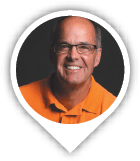 Steve Peloquin
Steve Peloquin
Peloquin Jenson PLLC, Park Rapids/Perham
We’re dependent on people who come and go and just walk in the door. So you’re looking at doing deeds and wills and trying to figure out how to resolve disputes economically and avoid courtroom expenses.
We do tons of family law. As a matter of course in a general practice in a rural area, you’re going to do family law. You’re not going to specialize, or it’s going to be rare. If you talk to any family law practitioner, in rural areas anyway, getting those bills paid is difficult. Even in cases that settle, which is most of them, the bill can be fairly high, the people are splitting and their economic base has just been divided by two. So you end up with a lot of
receivables, and there’s just a ton of family law. That’s part of our bread-and-butter work.
We live in lakes country here, and boundary disputes are an issue. You can spend 30 to 50 grand litigating cases that aren’t even jury trials. To really litigate a criminal case, you can spend that kind of money too. I did a felony trial a few years ago that was a big deal, and it was a $75,000 bill. Well, how many people do that? The answer is, a handful. So you’re never going to have that kind of practice. A criminal practice in the outstate [area]? Really difficult. It’s mostly public defender stuff, or people who just can’t afford the big guys.
If you look at real estate practice, that has changed dramatically in 30 years. The lawyers used to go to the closings and they did the documents; they were there to help at the signing. Hell, all that’s done at title companies now. Lawyers are completely cut out. Why? Cost. So you don’t see that. People are always coming in and asking, how can I get this done as cheaply as possible? That’s normal, but we struggle with that. I remind my folks that we have to remember who we’re serving here. And that reflects on our income, frankly.
At the [MSBA Greater Minnesota Practice Section], we’ve been talking about getting some real measure of lawyer incomes out here. It’s stuff people don’t want to talk about, but I can’t imagine that there’s a broad range of rural practitioners who make lots and lots of money—I’m talking about, say, six figures.
You look at judge and county attorney incomes, those guys make good money, I think. By the standards of rural areas, they make a lot of money. Plus they have all the benefits. We struggle with health insurance as a small firm, daycare benefits—all the stuff that just comes with a government job. I see solos going without malpractice insurance. We have it; I think that’s a service that’s needed. It’s something you should have for the sake of your clients, but that’s a way to cut costs for some folks. There are a lot of solos out here, and it’s tough. Our accounts receivable reflect that.
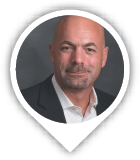 Antonio Tejeda Guzman
Antonio Tejeda Guzman
Tejeda Guzman PLLC, Willmar
I’m obviously not from here. [Laughs] I came to outstate Minnesota because I married this lady from here. Many years later we went through a divorce, but I stayed here because the practice is here. When I first came here, I was hired by a firm in Willmar with the intention to help one of the senior partners expand their workers’ compensation practice. It was with an eye on the local Latino market, which was growing. This is 16, 17 years ago, and that was still a relatively new thing. So it was driven by supply and demand and a very niche need driven by a very large meat-packing plant in Willmar.
That’s how I started doing what I do. As the years passed and I kept expanding my portfolio, I went independent a few years later and just kept doing workers’ compensation, because by then it was what I knew how to do to pay the bills. I like to think I was somewhat successful about it, and I frankly didn’t want to learn anything else. I didn’t want to learn family law; I’ve never done a divorce. I hadn’t done criminal law in 10 years.
So I just kept minding my niche. It was again driven by the market—no one else, or at least very few people, were doing it. When you get out of law school, everyone wants to be a “real lawyer” and do criminal law. Well, you can only be a PD or a prosecutor. Or people get out of law school and want to do family law. There’s lots of competition doing that. Workers’ comp is not high on anybody’s list, unfortunately. It should be.
Over 90 percent of my practice is Spanish-speaking-only clients. And now, so many years later into my practice, I closed my workers’ comp practice and I was a judge in St. Paul for a while. I didn’t necessarily like it. Maybe I was too young for that. So I resigned the bench and came back to practice about a year and a half ago. And I absolutely love it, I absolutely love the practice of law now. Before it was more like a burden. Now it feels more like a hobby that I truly love.
[As a judge] I saw things in ways I had not seen them before. I learned new things just seeing the totality of the process from a judge’s point of view. Only then did I fully grasp what a well-prepared advocate can really do. To be a judge, you really have to be willing to give up your advocacy hat. In hindsight, maybe I really wasn’t ready to do that when I took the bench. That was my fault. Call it youth and ignorance. Being on the bench really ignited a fire—made me say, I can do this and I can do it better without killing myself in the process.
So I came back, and I decided to do it differently than before. The business model became more of a niche, a boutique. So I have way fewer clients but I give way more service. And it turned out to be more profitable and a whole lot more enjoyable, mentally and physically. I became more selective with my clients, for one. Workers’ compensation is a contingency-fee practice, and that’s by statute. So if you lose, you lose—you don’t collect. So I learned to spot what’s a decent file, what’s a bad file, what’s a really good file. Is the judge going to like this person? Am I really willing to work for free for this guy to the end? I really have to like the person. It was all those factors that made me better able to say, I want this person for a client or I don’t want that person for a client. I became much more comfortable in saying, no, I don’t want you as a client. And that’s okay.
So that was the first big change. The second big change was being comfortable with a smaller case load, and not being so paranoid about, where’s my next file going to come from? You find your place in the market and you have faith in the market and the market is going to take care of you. I really do believe that. And it’s worked out well for me.
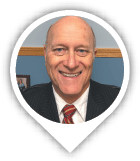 Robert A. Woodke
Robert A. Woodke
Brouse, Woodke & Hildebrandt, PLLP, Bemidji
I started in Bemidji in November of 1978. Before that I was a law clerk for the District Court of Minnesota in the 5th Judicial District. I came to Bemidji as an associate with Romaine Powell. At that time, I did about 50 percent litigation and the other half was a mix of office practice—very general practice, everything from drawing wills and deeds and powers of attorney to contracts for sales of resorts, financing documents, you name it. A broad-based small business practice, I guess you could say, dealing with the needs of individuals and small businesses.
And while I still do that, there have been a lot of changes over the course of my career. Most notably, a tremendous growth in bureaucratic paperwork in the courts, particularly in the field of family law. All these mandatory forms and so on. When I started practicing law, a heavy divorce file might end up being a half-inch thick. That’s everything—discovery, pleadings, the whole nine yards. Now those files fill bankers’ boxes.
I’ve narrowed my focus as the years have gone by. But I still do a variety of things. I gave up estate planning in 1995 when my other partner—Bruce Meyer, who’s now deceased—and I formed a partnership with Mike Brouse, who concentrated almost entirely on what I would call estate planning. That part of my practice went to Michael, who’s now retired, but now I have a new partner, Amber Hildebrandt, who does all of that kind of work in the firm.
I don’t do criminal litigation anymore. I also don’t do personal injury work anymore. I gave up personal injury work when a couple of ambulance chasers came to the area and I wasn’t willing to stoop to that. You’re either in personal injury work or you’re out of it; it’s not smart to dabble in personal injury law. It’s too complicated not to spend a lot of time on it. I found that, for me, a good commercial dispute or a good real estate dispute offered just as much personal satisfaction with a lot fewer headaches.
I still do product liability defense for manufacturing firms because I have unique knowledge of their products. I do that nationwide—not as much as I used to; I’m a victim of my own success. I had several manufacturers who, whenever they got sued, they wanted me to be in charge of their defense. As a result I was admitted pro hac vice in a number of jurisdictions, always affiliated with a local lawyer. Quite honestly, I had a really smart client, and they engaged me not only to defend the case but to assist them in their forward-looking risk management. So we’ve eliminated some of the risk by careful planning. So I don’t have to do it as much anymore, but I’ve got really happy clients who send me other business. I’m not going to complain about that.
 Angela Sipila
Angela Sipila
solo practitioner, Virginia
I prefer to practice with another lawyer. In the last 16 years, I have trained in eight lawyers and 10 legal assistants, but I always return to being solo because I make more money that way. Since every phone call just gets forwarded to me anyway, I might as well answer it. I have a part-time lawyer keeping me company two days a week currently.
I have a firewall, a network, three monitors, and two dogs. I don’t understand why HotDocs isn’t a better product. I want Siri to draft deeds for me. I was surprised to find out that my VoiceOverInternet phone line accepts and sends faxes and texts. I adore getting emails of the transcribed voice messages, because it tests my patience to listen to voice mail.
I don’t have time to keep track of my time. I use PCLaw to attempt to bill two hours a day. I usually cap my day at $600 for all-day mediations, and at $1200 for all-day court trials. At mediations, I’m playing on my phone during the downtime, and I’m not going to bill for that. Maybe this difference from charging for being present as a valuable-human-being to charging for the value-added is just me, but I don’t have clients screaming at me for over-charging, and I have some very cheap clients. I question whether I could be getting my work done faster. You can have fast, good, or cheap—pick two. I can’t spend eight hours a day cranking out documents. I often spend up to four straight hours drafting, with clients watching me type. Any intensive lawyering, such as working with clients, going to a contested court hearing, or mediating, drains my energy for the day and I need to goof off, either chatting or playing cards on the internet.
I do next to no criminal law— only if it’s a first-time offense and a misdemeanor, where the client can get a stay of adjudication, I’m a one-trick pony. If it’s anything more serious, if someone has any kind of record, or if the client qualifies for a public defender, then I get the file to someone else. And then I backseat-drive a little bit, trying to get that stay of adjudication so it won’t be on the client’s record.
I do legal work about six hours a day, counting meetings with clients. I’m on the phone for two hours, and then I spend two doing my administrative paperwork. I bill for about two hours a day. So I’m working about nine to 10 hours a day and billing about two. But that’s okay. Am I a private social worker? Sometimes. I spent about an hour this morning with a client who dropped in and brought doughnuts. Fabulous doughnuts.
Every once in a while I’ll have a big payday—a $10,000 or $15,000 probate in which the real estate sells. If I can keep my expenses low, that becomes my profit.
Next: Part 2: Changing Communities